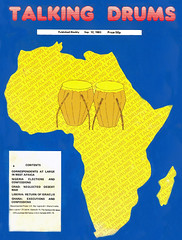Chad - Neglected Desert War?
But there is no denying the fact that the failure of the OAU summit to convene in Libya for lack of the required two-third membership quorum has left a terrible scar on Col. Qaddafi's reputation, and forced him to vary his tastics of spreading his influence across Africa. Already not less than five African countries have openly accused Col. Qaddafi of having meddled in their internal affairs.
Before their overthrow Ghana's President Hilla Limann and Upper Volta's President Jean Baptiste Quedrago accused Libya of threatening their stability and ordered Libyan diplomats out of their respective countries. Sudan's President Memeiry and Gambia's President Jawara accused Libya of active involvement in the abortive attempts to overthrow their governments. In Nigeria the long arm of Libya was reported to be lurking behind the religious riots in which scores of lives were lost in the northern part of the country. While the Chad situation has been amply authenticated, it is the fears being expressed by President Houphouet Boigny of the Ivory Coast which have given a new dimension to Libya's threats to an otherwise stable area of the West African region.
Not unnaturally, certain countries have reacted to this situation by evoking the Israeli factor as a counterpoint to the Libyan threat. President Mobutu Sese Seko of Zaire has re-established diplomatic relations with Israel while Chairman Samuel Doe of Liberia did not only dismiss his recalcitrant Foreign Minister on his way to establishing diplomatic relations with Israel, but Chairman Doe has also become the first Black African Head of State to break Africa's diplomatic blockade of Israel by paying state visit to a Jerusalem from August 23-27. Israeli optimism over this development anticipates further show of rapprochement from more African leaders.
In these circumstances, the Organisation of African Unity would have been expected to initiate decisive measures to stem the tide of the aptly called Libyan threat which has manifested itself in a number of West African countries, and is currently raging ferociously in Chad and has provided a pretext for the involvement of Zairean, American and French forces in Africa. However, several factors account for the lethargy of the African continental Organisation in this area. First, is the lack of cohesiveness among its membership which led to its inability to convene meetings over a long period. Secondly it is the ineffective role it played in the same Chad conflict when international troops sponsored by the Organisation looked on helplessly as Hissene Habre's forces over-run those of Goukhouni Weddeye in 1982.
Significantly, it is Qaddfi's realisation of the impotence of the OAU which has goaded him into attempting to solve Africa's problems his own way. This in turn has necessitated a decisive role for the friends of those countries which feel threatened by Libya.
Zaire, United States and the French are currently fulfilling this role in Chad on behalf of Egypt, Sudan and particularly the Ivory Coast whose President Houphouet Boigny has openly voiced concern over Col. Qaddafi's long arm which is threatening to extend to him through neighbouring Ghana and Upper Volta.
The political motivation for Col. Qaddafi's ambition of spreading his influence finds expression in his Green Book which advocates the setting up. revolutionary movements or committees of the masses to exercise authority and do away with governments. This is his Jamahariya philosophy with which he does not only condemn democracy as a dictatorship of only a few representatives acting on behalf of the masses. He also condemns the socialist system which he describes as a dictatorship of a few spokesmen of workers.
In order to give a practical demonstration of what the Green Book advocates, Col. Qaddafi seeks to overturn the African status quo to provide him with the needed launching pad.
Fortunately for him he has been overlooked, downplayed or totally ignored in the world power politics. Whereas the Soviet Union has found it convenient to ignore Qaddafi's threat to its socialist ideology, the United States of America and other Western countries have paid so little attention to Africa that they could not be bothered about what Qaddafi does to the continent.
France, which traditionally has ensured the stability of its African allies is also faced with the discomfiture of confronting a country which has not only been a major source of oil supply but also a big purchaser of French arms. These factors have influenced the international community to write off Chad as a barren desert and its problems as a conflict between two petty African chiefs and must therefore be ignored.
Surely, the ambitions of two rival African chiefs, Hissene Habre and Goukhouni Weddeye, fanned by external forces such Libya have as wreaked intolerable havoc on the innocent people of Chad for the past nineteen years of civil war in that country.
Secondly the threat to the stability of Africa from the Libyan Jamahariya has become real following the coups in Ghana, Upper Volta, and the war in Chad.
Col. Qaddafi's ambition to present his "GREEN BOOK" as the final solution to the problem of the instrument of governing deserves closer scrutiny and analysis from the international press and community.
The use of force alone is but temporary it may subdue for a moment but it does not remove the necessity of subduing again: and a nation is not governed, which is perpetually to be conquered
— Edmund Burke.
